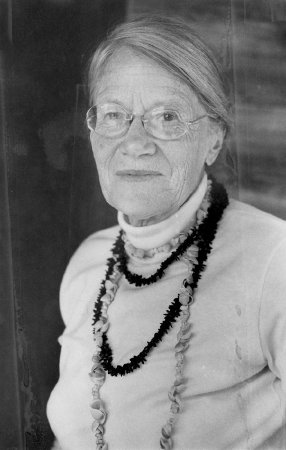Description:
Gertrud Schrader
Ketchikan Daily News Staff
Many families have a tradition of having guests sign the host's tablecloth on special occasions. Signatures are then embroidered to become a lasting memory of a meal shared with friends and family. Local legend, Gertrud Schrader inspired this tradition for several Ketchikan residents.
Schrader once wrote that she "was terribly disappointed in Ketchikan at first...I would have left if I hadn't been so stingy...I spent a lot of money to ship all of my earthly possessions here." Five months later, she'd settled into a log cabin six and a half miles south of town and was biking (or infamously hitchhiking) into her job at the Ketchikan General Hospital.
Schrader's extraordinary journey started in Latvia in 1909. Her father died during the Russian Revolution, leading her mother to escape with her and her brothers to Manchuria. While on vacation visiting her German grandmother, World War II broke out. Declaring her a "displaced person" due to her Russian and Manchurian addresses, the Nazis put her in jail. She was allowed out of prison, with a commitment to go to Nazi-occupied Poland to teach. Witnessing the Nazi atrocities against the Jews, she fled to Prague, eventually making her way to the United States after the war ended. Looking for a quiet, small town, a hospital job lured her to Ketchikan.
Here, she met Christian Schrader, a Danish immigrant and Ketchikan Spruce Mill machinist. The Schraders settled into domestic life together, hosting guests at their cabin. Following German tradition, she celebrated the twelve days of Christmas. Her guests were invited to sign her white linen tablecloth.
See Gertrud's embroidered tablecloth on display in our core exhibit Ketchikan is... and read about it in the May 2018 Artifact of the Month Virtual article
Schrader once wrote that she "was terribly disappointed in Ketchikan at first...I would have left if I hadn't been so stingy...I spent a lot of money to ship all of my earthly possessions here." Five months later, she'd settled into a log cabin six and a half miles south of town and was biking (or infamously hitchhiking) into her job at the Ketchikan General Hospital.
Schrader's extraordinary journey started in Latvia in 1909. Her father died during the Russian Revolution, leading her mother to escape with her and her brothers to Manchuria. While on vacation visiting her German grandmother, World War II broke out. Declaring her a "displaced person" due to her Russian and Manchurian addresses, the Nazis put her in jail. She was allowed out of prison, with a commitment to go to Nazi-occupied Poland to teach. Witnessing the Nazi atrocities against the Jews, she fled to Prague, eventually making her way to the United States after the war ended. Looking for a quiet, small town, a hospital job lured her to Ketchikan.
Here, she met Christian Schrader, a Danish immigrant and Ketchikan Spruce Mill machinist. The Schraders settled into domestic life together, hosting guests at their cabin. Following German tradition, she celebrated the twelve days of Christmas. Her guests were invited to sign her white linen tablecloth.
See Gertrud's embroidered tablecloth on display in our core exhibit Ketchikan is... and read about it in the May 2018 Artifact of the Month Virtual article
Ketchikan Museums: Ketchikan Daily News Collection, KM 93.2.15.1864

